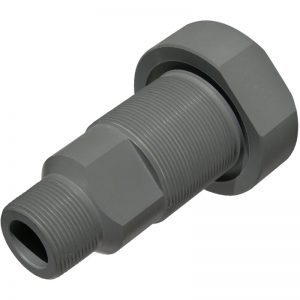ABS Plastic Manufacturing Experts at Jaco
Jaco understands the advantages of ABS plastic machining and can help you design a product that surpasses your initial expectations. You come to us at the pre-design phase, and we ensure you get the custom product you need.
ABS is an inexpensive plastic used in engineering, commonly used in prototypes created with pre-injection molding. Machining ABS plastic is a great option for mass-produced parts since they have an elite ability to maintain their mechanical properties in a variety of features.
If you need plastic parts machined, Jaco is one of the most capable and affordable sources. We’ll get the job done right.
ABS Plastic Machining Services | ABS Plastic Molding and Fabrication
Jaco Products is one of the leading suppliers of custom ABS plastic machining and molding services. ABS stands for acrylonitrile butadiene styrene, a material that offers incredible mechanical properties as well as superior durability and impact resistance.

About ABS Plastic
ABS plastic is a versatile thermoplastic material with exceptional dimensional stability as well as scratch resistance. It is also much less costly than other, more exotic resins. It is ideal for projects utilizing injection molding.
Jaco Products is also capable of coloring ABS plastic to match Pantones. This gives the designer a myriad of colors to select from. Metal coatings effectively adhere to ABS, offering more design and finish options due to simpler painting and plating. Popular colors of ABS plastic include black, bright white, flame red, fern green, soft gray, marigold, coconut, and graphite.
ABS is also recyclable at specific recycling facilities.
Applications of ABS Plastics
ABS plastic is applicable for a wide variety of consumer and industrial products. Some consumer examples include golf club heads and computer carrying cases, while industrial ABS applications include multiple industries such as marine, medical, automotive interiors and appliance manufacturing. ABS plastic offers a variety of benefits, including:
- Heat and cold resistance. This plastic performs well at any temperature.
- Resistance to aqueous acids, alkalis, concentrated hydrochloric and phosphoric acids.
- Alcohol resistance.
- Resistance to animal, vegetable, and mineral oils.
- It works as an ideal electrical insulator with added moisture resistance.
- Easy to machine.
ABS plastic machining is also ideal for a variety of applications, including:
- Musical instruments
- Wheel covers
- Auto body parts
- Enclosures
- Toys
- Protective headgear
ABS Plastic Molding
The Jaco team consists of experts in the injection molding of complicated materials such as standards and glass-filled ABS plastic. We also have the capabilities to mold ABS plastic with glass fibers and other additives to increase the overall strength of the component. Additionally, this increases the maximum operating temperatures to 176°F.
ABS Plastic Machining
Machining ABS plastic allows for the creation of complex, high-tolerance parts that need 5-axis machining. Jaco Products is capable of efficiency producing components that typically require multi-slide injection molds with threads, holes, ports and other complex shapes in smaller prototyping runs as well as large volume runs.
We also offer a wide range of ABS plastic machining services including milling, drilling, sawing, turning, shearing, threading, stamping and die-cutting.
ABS Plastic Molding & Machining
If you need complex, high-tolerance ABS components, the Jaco technical staff with use both the ABS molding and 5-axis CNC machining processes. First, we injection mold an approximate shape of the ABS part. We then machine the part to meet the tolerance requirements while milling ports, threads and undercuts. Many customers have brought us ABS components that other injection molding companies refused to quote. At Jaco products, however, we can fabricate the part successfully with multiple manufacturing processes. We can create prototypes in shorter runs for testing and analysis before you make a full investment in ABS part molds.
Fabrication and Finishing Services
In addition to molding and machining, Jaco offers a full range of ABS manufacturing and finishing services such as welding, stamping, engraving, assembly, kitting, and pad printing. We can also implement outside services including metal plating.
Jaco’s manufacturing processes follow ISO 9001:2008 quality standards.
ABS Plastic Product Engineering
Our technical staff includes experienced designers, so you can design the ideal ABS component for your application. We offer unparalleled knowledge in materials and manufacturing techniques. Jaco can develop multifaceted solutions to your component design challenges. Contact us today to discuss component design with our technical staff.
Plastic Machining: The Affordable, Reliable Alternative
The price of metals continues to fluctuate, forcing product designers to find other alternatives for machining their products. Plastic is not only a reliable alternative, but can also be better than the original metal design.
Many of the machines and tools used for CNC machine plastic are similar to those used for metal. However, it still takes skill and know-how to work with plastics. Cutting plastic is not the same as cutting metal even within plastics there are variations. Therefore, only an experienced plastic machining expert is going to understand these nuances and give you the results you need.
Jaco has been providing machined ABS for decades. We offer reliable products and customer service for an affordable price. We use ABS plastic machining to ensure you get the durable product you expect.
If you would like to know more about machining plastics or you want to speak to someone about the benefits of plastic machining, speak with an expert at Jaco. Call us today on 440-632-5800.

